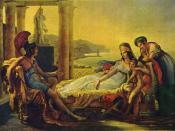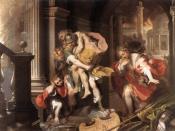written for AP English class Exam Paper -
Fate - Would Homer & Virgil be the same with out it?
In Virgil's Aeneid and Homer's Iliad, a picture of the supernatural and its workings was created. In both works, there is a concept of a fixed order of events which is called fate. Fate involves two parts. First, there are laws that govern certain parts of mens' lives, such as human mortality and an afterlife. Second, fate deals with the inevitable outcome of certain events, outcomes that cannot be changed by men or gods.
Both Homer and Virgil allude to the existence of unchangeable laws, one of which is the mortality of human beings. This can be seen by the fact that character after character dies during war. In Virgil's Aeneid, Aeneas journeys to Hades to visit his father. During his stay, he talks to a large number of the warriors that have died in the Trojan War.
The death of these warriors shows the mortality of human beings (Forman 2015). Another unchangeable law is the period of limbo that is said to await the souls of the unburied after death. Homer indicates this law by writing of Patroklos' spirit's return to remind Achilles that, until he has been properly buried, he must wander the earth. These events show Virgil's and Homer's belief in laws that cannot be changed (Strong 62).
The second element of Fate deals with the unalterable predestined occurrence of certain events. One example of such an event is the fall of Troy. According to Homer, the destruction of Troy was foretold in Hekuba's dream that her son, Paris, would be the cause. This prophecy was confirmed by a seer. Although Hekuba tried to avert the disaster by attempting to have Paris killed, fate overcame and...


